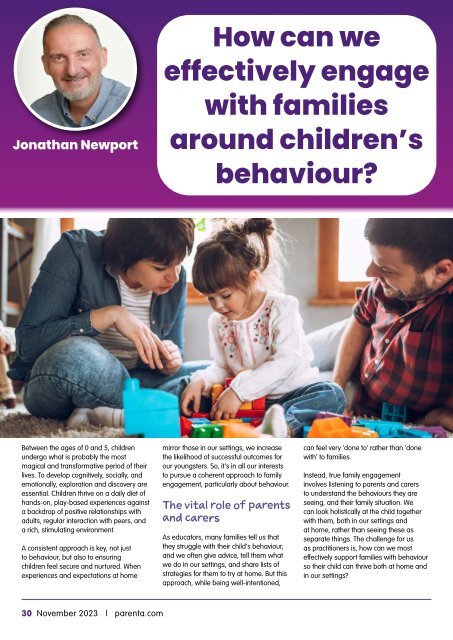November 2023 Parenta magazine
Create successful ePaper yourself
Turn your PDF publications into a flip-book with our unique Google optimized e-Paper software.
Jonathan Newport<br />
Between the ages of 0 and 5, children<br />
undergo what is probably the most<br />
magical and transformative period of their<br />
lives. To develop cognitively, socially, and<br />
emotionally, exploration and discovery are<br />
essential. Children thrive on a daily diet of<br />
hands-on, play-based experiences against<br />
a backdrop of positive relationships with<br />
adults, regular interaction with peers, and<br />
a rich, stimulating environment.<br />
A consistent approach is key, not just<br />
to behaviour, but also to ensuring<br />
children feel secure and nurtured. When<br />
experiences and expectations at home<br />
How can we<br />
effectively engage<br />
with families<br />
around children’s<br />
behaviour?<br />
mirror those in our settings, we increase<br />
the likelihood of successful outcomes for<br />
our youngsters. So, it’s in all our interests<br />
to pursue a coherent approach to family<br />
engagement, particularly about behaviour.<br />
The vital role of parents<br />
and carers<br />
As educators, many families tell us that<br />
they struggle with their child’s behaviour,<br />
and we often give advice, tell them what<br />
we do in our settings, and share lists of<br />
strategies for them to try at home. But this<br />
approach, while being well-intentioned,<br />
can feel very ‘done to’ rather than ‘done<br />
with’ to families.<br />
Instead, true family engagement<br />
involves listening to parents and carers<br />
to understand the behaviours they are<br />
seeing, and their family situation. We<br />
can look holistically at the child together<br />
with them, both in our settings and<br />
at home, rather than seeing these as<br />
separate things. The challenge for us<br />
as practitioners is, how can we most<br />
effectively support families with behaviour<br />
so their child can thrive both at home and<br />
in our settings?<br />
c<br />
We also need to be open to learning from<br />
parents and carers, rather than assuming<br />
we have all the answers when considering<br />
strategies to support behaviour. We can<br />
share approaches and ideas and adopt<br />
a puzzle-solving approach to behaviour,<br />
where we are curious, try things out, and<br />
find what works for this child, in an everevolving<br />
process.<br />
Bridging the gap<br />
We all have the children’s best interests<br />
at heart; however, there can sometimes<br />
be a disconnect between home and our<br />
settings regarding behaviour. To bridge<br />
this gap, we need to acknowledge and<br />
understand any potential barriers and<br />
work with families to understand them.<br />
For many parents and carers, handing<br />
over the care of their child to another<br />
person can be both daunting and<br />
challenging. They may feel anxious<br />
about how their child will respond in a<br />
new setting and some of that anxiety<br />
may rub off on the child. For children with<br />
diagnosed or suspected additional needs<br />
and disabilities, there are often additional<br />
concerns about whether a setting will<br />
be able to support their needs. We also<br />
need to be mindful of the fact that some<br />
parents and carers will have had prior<br />
experiences themselves, which can affect<br />
their responses to our expectations and<br />
initiatives around behaviour.<br />
Parents and carers can also hold widely<br />
different views about behaviour. What is<br />
acceptable to one family might be wholly<br />
unacceptable to another. We therefore<br />
need to reflect on the reasons that<br />
underpin individuals’ differing perspectives<br />
and see different options and positive<br />
approaches as choices available to us<br />
rather than try to implement a one-sizefits-all<br />
‘solution’.<br />
Practical ideas<br />
for building family<br />
engagement around<br />
behaviour<br />
To create strong, long-lasting relationships<br />
with our families, we need to develop<br />
effective, positive, and inclusive strategies<br />
around behaviour. These 5 suggestions<br />
are a useful starting point for framing<br />
internal discussions between leaders and<br />
practitioners, and can help drive future<br />
action planning:<br />
1: Keep an open mind<br />
It’s important not to make any<br />
assumptions about the support that<br />
parents and carers want or need. By taking<br />
the time to see behaviour through their<br />
lens and find ongoing ways to collate their<br />
views and opinions, we can ensure we<br />
are engaging in ways that are timely and<br />
appropriate.<br />
2: Extend our reach<br />
Sometimes, even the most effective<br />
engagement strategies are only partially<br />
successful because they do not reach all<br />
families. For example, arranging coffee<br />
mornings or drop-ins may suit some<br />
people, but others might miss out due to<br />
work or other commitments.<br />
Taking a creative and curious approach<br />
can be helpful. Who are the ‘hard to reach’<br />
families and what could we do to remove<br />
existing barriers? This might involve getting<br />
out into the community more regularly,<br />
looking at ways technology could support,<br />
and offering alternative times for drop-in<br />
sessions.<br />
3: Consider our local context<br />
All contexts and communities are different,<br />
and as such, will require a bespoke<br />
approach to family engagement. For<br />
example, if language is a barrier to<br />
communication, how could we engage<br />
with families in their first language? Do<br />
some families have limited access to<br />
technology, resulting in them being unable<br />
to access our initiatives? By taking our<br />
families’ social, economic, and cultural<br />
backgrounds into account, we can<br />
devise the best strategies for supporting<br />
behaviour.<br />
4: Share our approach to<br />
behaviour<br />
Approaches to behaviour have evolved<br />
over the years, and we must keep parents<br />
and carers informed about our strategies<br />
and ethos. When families are clear about<br />
why we do things, not just what we do,<br />
they are more likely to engage with and<br />
support us.<br />
This was one of the underpinning ideas<br />
when we created the “Team Teach Family<br />
Engagement Training” course because<br />
we recognised that our approaches to<br />
behaviour support also need to be shared<br />
with and understood by families for them<br />
to be most effective.<br />
5: Work as a team<br />
Parents and carers know their children<br />
better than anyone else, so by tapping into<br />
each other’s expertise and experience,<br />
we can collaborate to find strategies<br />
that work for all of us. This is especially<br />
important when we consider families<br />
that are involved in multi-agency support<br />
and receiving guidance from several<br />
professionals; there is a risk that they<br />
might become overwhelmed by conflicting<br />
perspectives. In such cases, a coherent,<br />
strategic approach is essential.<br />
A golden opportunity<br />
Fuelled by curiosity, compassion, and<br />
connection, we have a golden opportunity<br />
to examine and improve our approaches<br />
to family engagement around behaviour.<br />
By taking a joined-up, unified approach,<br />
we can empower families to understand<br />
and support their child’s behaviour,<br />
helping them to become resilient, happy,<br />
and healthy individuals.<br />
Consistency is a key component of<br />
understanding and responding to<br />
behaviour, so by fostering strong home<br />
links based on mutual trust and respect,<br />
early years settings and families can work<br />
in harmony to ensure the best outcomes<br />
for every child.<br />
Scan here to<br />
learn more<br />
about Jonathan:<br />
30 <strong>November</strong> <strong>2023</strong> | parenta.com<br />
parenta.com | <strong>November</strong> <strong>2023</strong> 31
















